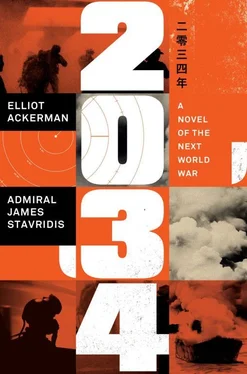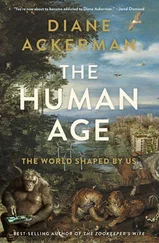His thoughts inexplicably turned to the one-way radios on the Soviet tanks during the Second World War, that cautionary case study at the US Naval War College about overly centralized command structures. His wife and daughter had loved Newport, the winter snowstorms spent huddled by the fireplace and that single glorious summer when on weekends they would rent a dinghy from Goat Island and then let out full-sail, passing beneath the Claiborne Pell suspension bridge as they headed toward the hulking gray facade of the historic Naval War College, where they’d beach their dinghy and spread a picnic on a blanket in the sand. With his shoes off, reclining alongside his family, Lin Bao had talked about his retirement back then too. His idea: to teach at the war college.
He smiled self-consciously even thinking of it. How preposterous it seemed now.
The disembodied voice interrupted: “Twenty-two minutes on-station time remaining. Standing by for additional taskings….” The combat information center on the Zheng He responded, sending the unmanned flight out into the spectral blast-scape to further confirm what was obvious at a glance: the destruction of everything.
I would have taught history, thought Lin Bao, his mind wandering as he considered the live feed. His dream to teach was one that he didn’t speak of to anyone, not even his wife. Had he acted on it those years ago he never would have made admiral. He would have retired from the Navy as a commander, a respectable rank. His dual US citizenship and his doctorate would have been enough to land him a job. As a former Chinese naval officer, he would have brought a unique perspective to the faculty. He had never quite relinquished the dream. Over the years, he had composed a curriculum for a few classes in his mind. He never dared write them down; that would have made the dream too real, and deferring it too painful.
He imagined himself at the lectern discussing the ancient Greeks to his American students: “The First Persian War, in which Miltiades defeats Darius at Marathon in 490 BC, leads to the Second Persian War, in which the Athenian navy commanded by Themistocles destroys the Persian navy under Xerxes at Salamis in 480 BC. Ten years of war gives the Greeks fifty years of peace, a golden age. The Athenians secure peace on the Hellespont through the Delian League, a mutual-security pact in which the other Greek city-states pay Athens a tribute to protect them against future Persian aggression. Sound familiar?” Lin Bao would then imagine himself looking out at his class, at their blank expressions, in which the past held no relevance, in which there was only the future and that future would always be American.
Then, in his imagined class, Lin Bao would tell his students of their past but also of their future. He would explain how America’s golden age was born out of the First and Second World Wars, just as Greece had found its greatest era of prosperity in the aftermath of the two Persian Wars. Like the Athenians with the Delian League, Lin Bao would explain how the Americans consolidated power with mutual-security pacts such as NATO, in which they would make the largest contributions in exchange for military primacy over the western world—much as the Athenians had gained military primacy of the then-known world through the Delian League.
Lin Bao would always wait for the question he knew was coming, in which one of his students would ask why it all ended. What external threat overwhelmed the Delian League? What invader accomplished what the Persian fleet could not at Salamis? And Lin Bao would tell his students that no invader had come, no foreign horde had sabotaged the golden age forged by Miltiades, Themistocles, and Greece’s other forefathers.
“Then how?” they would ask. “If the Persians couldn’t do it, who did?”
And so, he would say, “The end came—as it always does—from within.”
He would explain this patiently, like a father telling a beloved child that the Easter Bunny or another cherished fairy tale didn’t exist, and while his students’ puzzled expressions fixed on him, he would tell them about the jealousy of the Spartans, the fear they felt for the broadening powers of the Delian League. He would also tell them about Athens, drunk on its own greatness, blinded by narcissism and decadence. “Look over the ages,” he would assert, “from Britain, to Rome, to Greece: the empire always rots from within.” Most of his students, he knew, would underwhelm him. They would stare back in disbelief, or even hostility. Their assumption would always be that the time in which they lived could never be usurped; it was singular, as they believed themselves to be singular. Endemic dysfunction in America’s political life hardly mattered because America’s position in the world was inviolate. But a few of his students, their faces clear in his imagination, would return his stare as if his understanding had become their own.
What Lin Bao wondered now, as he watched the last of the live feed, the skeletal remains of buildings, the rush-hour commute left incinerated on the highway, was what rank those few American students would hold today. Some would likely be admirals, like himself.
What if he had retired early? What if he had taught and reached a few of them?
Would there have been a Zhanjiang? A San Diego? A Galveston?
Probably so, but he allowed himself to conjure an alternative history, one in which the miscalculations of the past four months had not occurred, one in which incidents like the Wén Rui and battles like Mischief Reef and Taiwan had never happened. Perhaps a single dissenting voice, properly applied, had prevented this collective madness. The historian in him couldn’t resist placing these events into a causative order, in which each became a link in an otherwise interruptible chain, one that had bound them to this moment, where Lin Bao—seated at the conference table, staring at the live feed—was witnessing the single greatest act of destruction in the history of mankind.
But there was nothing he could do about any of this.
The task before him was simple: to observe the last of the live feed and to pass along to the Zheng He the order that sat in front of him on the table. It tasked the carrier and its escorts to return from the Pacific to the South China Sea at best speed to “defend against the American threat in our waters.”
Another fifteen minutes had passed.
The drone operator continued to survey the blast-scape. Then, with fuel running low, he announced that he’d be checking off-station in seven minutes. With his hollow, disembodied voice, the drone operator radioed to the Zheng He , asking whether they had any further taskings.
The Zheng He had none.
Next, the drone operator called to the Defense Ministry and asked if they had any further taskings. Lin Bao picked up the handset on the satellite uplink, connecting him directly to the drone operator. He said the Defense Ministry had no further taskings.
There was a moment of silence.
The drone operator again asked if the Defense Ministry had any further taskings. Lin Bao repeated himself into the handset.
Nothing.
There’d been some breakdown in communications. A member of Lin Bao’s support staff rushed into the conference room, untangling wires beneath the table, toggling switches on and off at the back of the satellite uplink, while Lin Bao repeated over and over again that he’d seen enough, that he had no further taskings, that he didn’t need to see any more.
There was no response.
Lin Bao kept repeating himself. He was frantic to deliver his message, frantic to hear a response on the other end of the line from that hollow, disembodied voice.

Читать дальше













